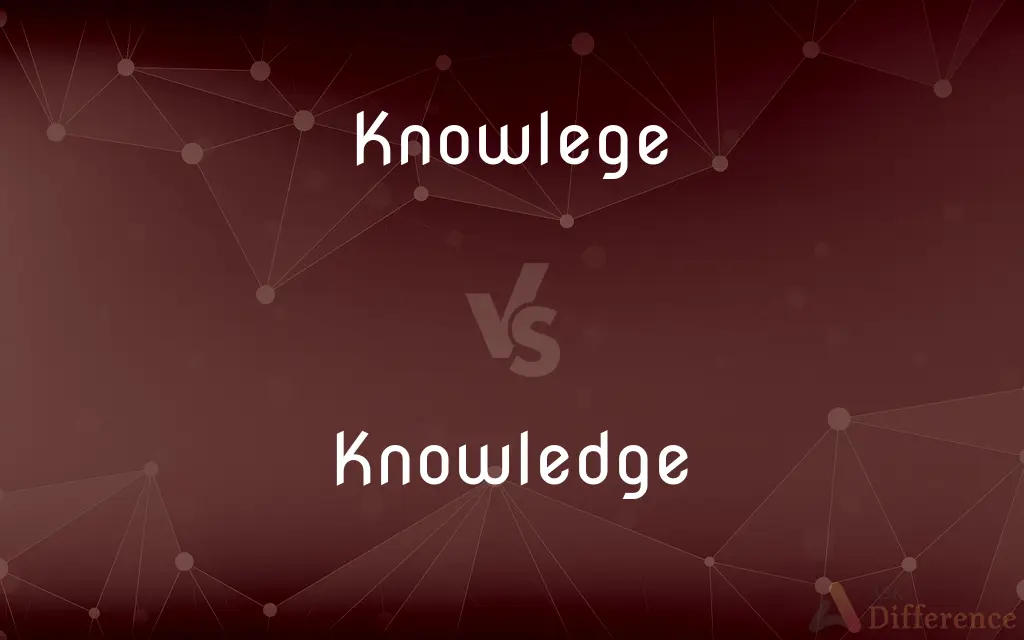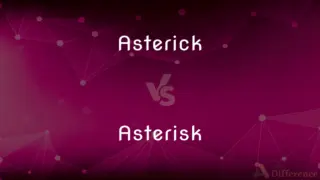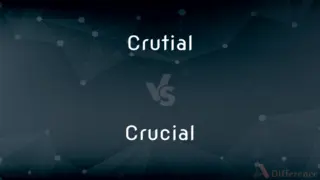Knowlege vs. Knowledge — Which is Correct Spelling?
Edited by Tayyaba Rehman — By Fiza Rafique — Updated on April 1, 2024
"Knowlege" is a misspelling. The correct spelling is "knowledge," which refers to the understanding or awareness of information.

Table of Contents
Which is correct: Knowlege or Knowledge
How to spell Knowledge?

Knowlege
Incorrect Spelling

Knowledge
Correct Spelling
ADVERTISEMENT
Key Differences
Think of "knowledge" as the fusion of "know" and "acknowledge" without the "ack."
Associate "knowledge" with "edge," as it gives you an edge over others.
Remember the phrase "know the edge" to keep the "d" in mind.
Visualize it as "knowLEDGE" to emphasize the "LEDGE" part.
Think of "know" at the beginning, then add "ledge" without the "e" in between.
ADVERTISEMENT
How Do You Spell Knowledge Correctly?
Incorrect: The quiz tested our knowlege of world capitals.
Correct: The quiz tested our knowledge of world capitals.
Incorrect: Her knowlege of the subject impressed everyone.
Correct: Her knowledge of the subject impressed everyone.
Incorrect: I'm always eager to expand my knowlege on various topics.
Correct: I'm always eager to expand my knowledge on various topics.
Incorrect: He prides himself on his vast knowlege of history.
Correct: He prides himself on his vast knowledge of history.
Incorrect: His lack of knowlege in the field became apparent.
Correct: His lack of knowledge in the field became apparent.
Knowledge Definitions
The understanding or awareness of facts, skills, or information.
Her knowledge of history is commendable.
The sum of what is known.
Libraries are storehouses of human knowledge.
The theoretical or practical understanding of a subject.
He possesses in-depth knowledge about marine biology.
The state or fact of knowing
Humans naturally aspire to knowledge.
Familiarity, awareness, or understanding gained through experience or study
Has great knowledge of these parts.
Has only limited knowledge of chemistry.
The sum or range of what has been perceived, discovered, or learned
The extraordinary knowledge housed in the library.
(Archaic) Carnal knowledge.
The fact of knowing about something; general understanding or familiarity with a subject, place, situation etc.
His knowledge of Iceland was limited to what he'd seen on the Travel Channel.
Awareness of a particular fact or situation; a state of having been informed or made aware of something.
Intellectual understanding; the state of appreciating truth or information.
Knowledge consists in recognizing the difference between good and bad decisions.
Familiarity or understanding of a particular skill, branch of learning etc.
Does your friend have any knowledge of hieroglyphs, perchance?
A secretary should have a good knowledge of shorthand.
(philosophical) Justified true belief
Sexual intimacy or intercourse (now usually in phrase carnal knowledge).
(obsolete) Information or intelligence about something; notice.
The total of what is known; all information and products of learning.
His library contained the accumulated knowledge of the Greeks and Romans.
(countable) Something that can be known; a branch of learning; a piece of information; a science.
(obsolete) Acknowledgement.
(obsolete) Notice, awareness.
The deep familiarity with certain routes and places of interest required by taxicab drivers working in London, England.
(obsolete) To confess as true; to acknowledge.
The act or state of knowing; clear perception of fact, truth, or duty; certain apprehension; familiar cognizance; cognition.
Knowledge, which is the highest degree of the speculative faculties, consists in the perception of the truth of affirmative or negative propositions.
That which is or may be known; the object of an act of knowing; a cognition; - chiefly used in the plural.
There is a great difference in the delivery of the mathematics, which are the most abstracted of knowledges.
Knowledges is a term in frequent use by Bacon, and, though now obsolete, should be revived, as without it we are compelled to borrow "cognitions" to express its import.
To use a word of Bacon's, now unfortunately obsolete, we must determine the relative value of knowledges.
That which is gained and preserved by knowing; instruction; acquaintance; enlightenment; learning; scholarship; erudition.
Knowledge puffeth up, but charity edifieth.
Ignorance is the curse of God;Knowledge, the wing wherewith we fly to heaven.
That familiarity which is gained by actual experience; practical skill; as, a knowledge of life.
Shipmen that had knowledge of the sea.
Scope of information; cognizance; notice; as, it has not come to my knowledge.
Why have I found grace in thine eyes, that thou shouldst take knowledge of me?
To acknowledge.
The psychological result of perception and learning and reasoning
Information acquired through experience or education.
Traveling has expanded his knowledge of different cultures.
The awareness or familiarity of someone or something.
I have no knowledge of that incident.
Knowledge Meaning in a Sentence
With knowledge comes responsibility.
They debated using their knowledge of science.
She shared her knowledge of gardening with the community.
The teacher's knowledge inspired his students to learn more.
Gaining knowledge is a lifelong journey.
His knowledge of ancient languages is remarkable.
Her knowledge about the local ecosystem was invaluable during the hike.
He writes articles to spread knowledge about environmental issues.
He sought knowledge in books, nature, and experiences.
The library was a treasure trove of knowledge.
Their cultural knowledge was crucial to understanding the artwork.
The internet has made access to knowledge easier than ever.
Their knowledge of the area helped them navigate the city.
His knowledge of cooking came from years of practice.
She valued the knowledge gained from real-life experiences.
The conference was a gathering of minds hungry for new knowledge.
The museum offered knowledge and insight into the region's history.
He applied his knowledge of physics to solve the problem.
Knowledge of first aid can save lives.
The wisdom of elders is knowledge that benefits the whole community.
She passed the test easily, thanks to her extensive knowledge.
Sharing knowledge can help build a better world.
Her knowledge of musical theory enhanced their band's performance.
She pursued knowledge with passion and dedication.
The ancient scrolls contained knowledge lost to time.
Knowledge Idioms & Phrases
Common knowledge
Something that is known by many people.
It's common knowledge that the Earth orbits the Sun.
A wealth of knowledge
Having a lot of knowledge about a particular subject or subjects.
The veteran journalist was a wealth of knowledge on political history.
To come to one's knowledge
To become known to someone.
It only recently came to my knowledge that they had moved away.
Common Curiosities
What is the root word of knowledge?
The root word is "know."
Why is it called knowledge?
It's called "knowledge" to represent understanding, awareness, or information one has acquired.
Which preposition is used with knowledge?
"Of" is commonly used, as in "knowledge of."
Which conjunction is used with knowledge?
There isn't a specific conjunction tied to the word "knowledge"; it depends on the sentence.
What is the singular form of knowledge?
The singular form is "knowledge."
Is knowledge a noun or adjective?
"Knowledge" is a noun.
What is the pronunciation of knowledge?
It is pronounced as /ˈnɑː.lɪdʒ/.
What is the verb form of knowledge?
The related verb form is "know."
Which vowel is used before knowledge?
The vowel "o" is used before the "w" in "knowledge."
What is the plural form of knowledge?
Knowledge is typically uncountable and does not have a standard plural form.
Is knowledge an abstract noun?
Yes, "knowledge" is an abstract noun.
Is knowledge a negative or positive word?
"Knowledge" is neutral, but it often carries a positive connotation.
Is knowledge a countable noun?
No, "knowledge" is an uncountable noun.
Is knowledge a collective noun?
No, "knowledge" is not a collective noun.
How do we divide knowledge into syllables?
It can be divided as: knowl-edge.
What is the third form of knowledge?
N/A. For the verb "know," the third form is "known."
Is knowledge a vowel or consonant?
"Knowledge" is a word comprised of both vowels and consonants.
How many syllables are in knowledge?
There are two syllables in "knowledge."
What is the opposite of knowledge?
The opposite could be "ignorance."
What is the second form of knowledge?
N/A. For the verb "know," the second form is "knew."
Which article is used with knowledge?
Both "a" and "the" can be used depending on the context, but "knowledge" is often used without an article.
What part of speech is knowledge?
"Knowledge" is a noun.
What is another term for knowledge?
Another term might be "awareness" or "information."
Which determiner is used with knowledge?
Determiners like "some," "much," or "little" can be used with "knowledge."
Is the knowledge term a metaphor?
Not inherently, but it can be used metaphorically in various contexts.
How is knowledge used in a sentence?
Example: Gaining knowledge is essential for personal growth.
Is knowledge an adverb?
No, "knowledge" is not an adverb.
Is the word knowledge imperative?
No, "knowledge" is not imperative.
What is a stressed syllable in knowledge?
The first syllable "knowl" is stressed.
What is the first form of knowledge?
N/A. "Knowledge" is a noun and doesn't have verb forms. For the verb "know," the first form is "know."
Share Your Discovery

Previous Comparison
Asterick vs. Asterisk
Next Comparison
Crutial vs. CrucialAuthor Spotlight
Written by
Fiza RafiqueFiza Rafique is a skilled content writer at AskDifference.com, where she meticulously refines and enhances written pieces. Drawing from her vast editorial expertise, Fiza ensures clarity, accuracy, and precision in every article. Passionate about language, she continually seeks to elevate the quality of content for readers worldwide.
Edited by
Tayyaba RehmanTayyaba Rehman is a distinguished writer, currently serving as a primary contributor to askdifference.com. As a researcher in semantics and etymology, Tayyaba's passion for the complexity of languages and their distinctions has found a perfect home on the platform. Tayyaba delves into the intricacies of language, distinguishing between commonly confused words and phrases, thereby providing clarity for readers worldwide.


































